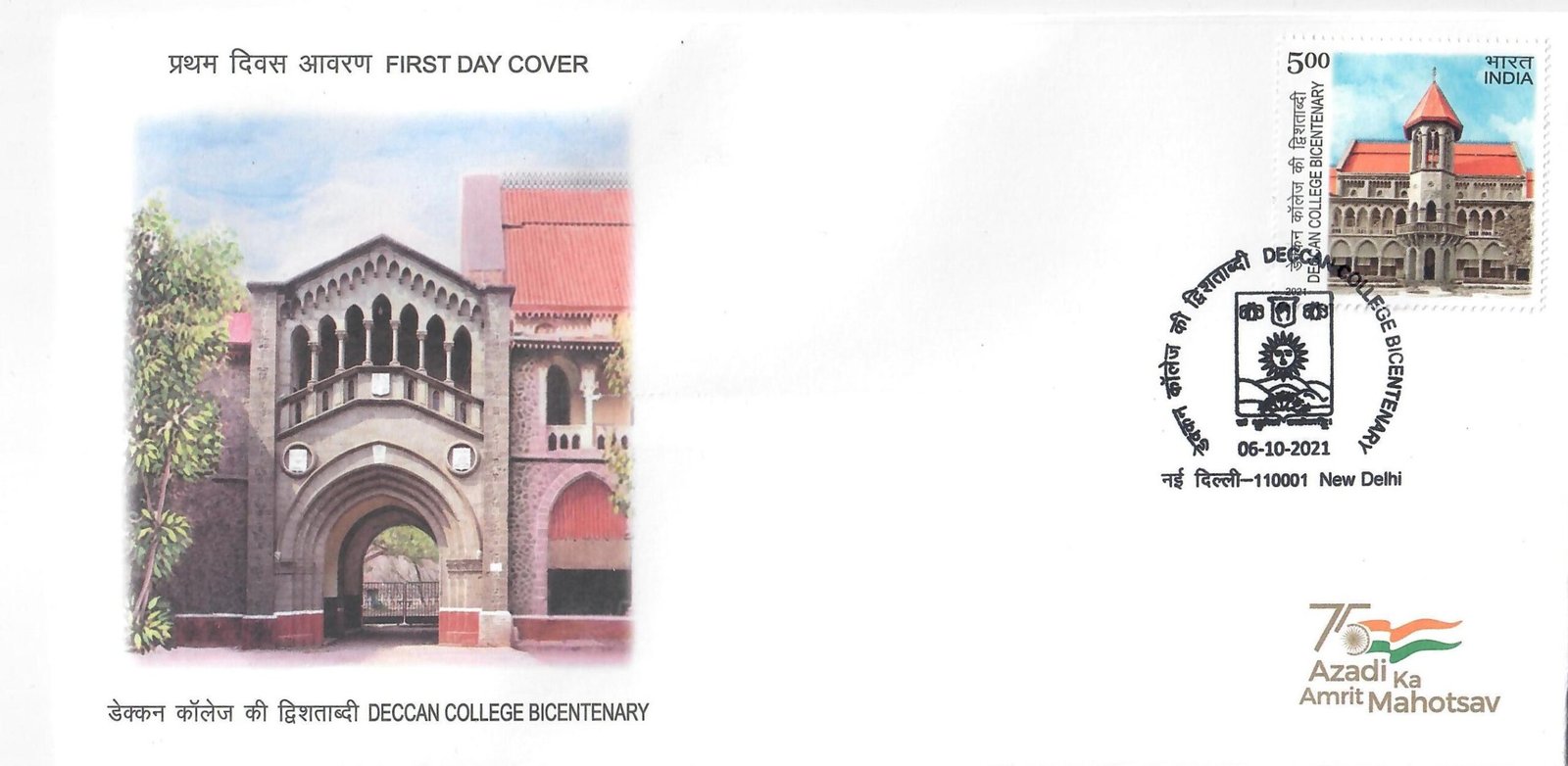Bicentenary of Deccan College, Pune

Technical Data
| Date of Issue | October 6, 2021 |
|---|---|
| Denomination | Rs. 5 |
| Quantity | 307,157 |
| Perforation | 14½ |
| Printer | Security Printing Press, Hyderabad |
| Printing Process | Wet Offset |
| Watermark | No Watermark |
| Colors | Multicolor |
| Credit (Designed By) | Sh. Sankha Samanta |
| Catalog Codes |
Michel IN 3741 Stamp Number IN 3259 Yvert et Tellier IN 3416 Stanley Gibbons IN 3789 |
| Themes | Anniversaries and Jubilees | Buildings | Universities |
Deccan College, Pune: Celebrating 200 Years of Academic Excellence
The Deccan College, Postgraduate and Research Institute, Pune is one of India’s oldest and most prestigious educational institutions, with a history spanning over two centuries. Established on 6th October 1821 as the Hindu College under the Bombay Presidency Government, it was initiated by Governor Mount Stuart Elphinstone using the Dakshina Fund, originally started by Maratha Sardar Khanderao Dabhade and later continued by the Peshwas to promote Sanskrit learning.
Over the years, the institution flourished and was renamed the Poona College in 1851, and later the Deccan College in 1864. It shifted to its current expansive campus of 115 acres near Yerawada on 23rd March 1868, where the iconic Gothic-style main building—funded by Sir Jamsetji Jeejeebhoy’s generous donation of ₹1 lakh—still stands as a symbol of heritage and learning.
Legacy of Great Minds
Through its long history, Deccan College has produced remarkable alumni who shaped India’s intellectual and social fabric. These include:
- Sir Ramkrishna Gopal Bhandarkar, the celebrated Indologist
- Lokmanya Bal Gangadhar Tilak, the nationalist leader and freedom fighter
- Gopal Ganesh Agarkar, the social reformer
- Gurudev Ramchandra Dattatraya Ranade, the philosopher
- Vishwanath Kashinath Rajwade, the historian
- Dr. Dwarkanath Kotnis, the renowned doctor who served in China
The college briefly closed in 1934 under British rule but reopened in 1939 as the Deccan College, Postgraduate and Research Institute, marking the beginning of a new era in research and higher learning.
A Global Hub for Research and Scholarship
In the decades that followed, Deccan College earned global recognition for pioneering work in Ancient Indian History, Archaeology, Linguistics, Anthropology, Sociology, Sanskrit, and Maratha History. Eminent scholars such as Professors S. M. Katre, H. D. Sankalia, Irawati Karve, and M. K. Dhavalikar elevated the institute to international fame through their groundbreaking research.
Acknowledging its excellence, the Government of India granted Deccan College the status of a Deemed University in 1990.
Centres of Excellence
- The Department of Sanskrit and Lexicography is the only one of its kind in India, combining both Sanskrit studies and lexicography. Its monumental Encyclopedic Sanskrit Dictionary Project, based on historical principles, houses over 10 million references from Sanskrit literature.
- The Department of Archaeology is globally renowned, ranked second only to the Institute of Archaeology, London, for its infrastructure, faculty, and research output.
In recent years, the University has expanded its outreach by offering certificate and short-term courses in Ancient Maharashtra, Indian Thought, Computational Linguistics, and Phonetics, ensuring its expertise benefits the wider community.
The Bicentenary Stamp
To honour 200 years of Deccan College, the Department of Posts has issued a commemorative postage stamp. This philatelic tribute recognizes the institute’s unparalleled contribution to archaeology, linguistics, and higher education—a legacy that continues to inspire generations of scholars and researchers.
First Day Cover

